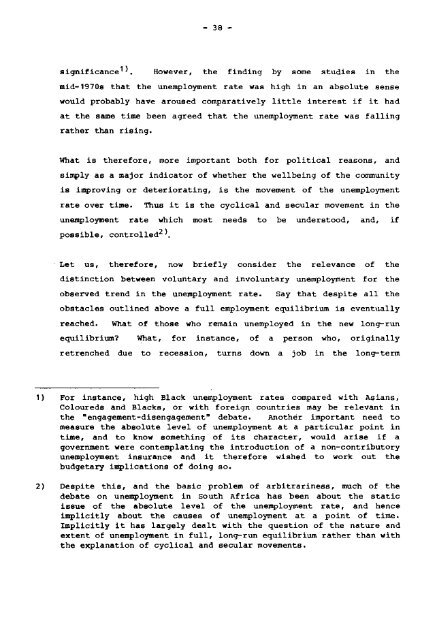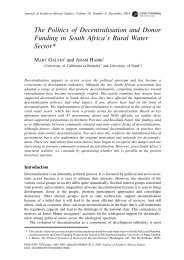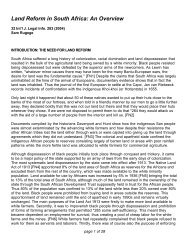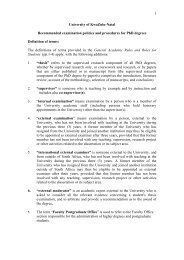Bell, Trevor : Unemployment in South Africa
Bell, Trevor : Unemployment in South Africa
Bell, Trevor : Unemployment in South Africa
You also want an ePaper? Increase the reach of your titles
YUMPU automatically turns print PDFs into web optimized ePapers that Google loves.
significance1). However, the f<strong>in</strong>d<strong>in</strong>g by some studies <strong>in</strong> the<br />
mid-1970s that the unemployment rate was high <strong>in</strong> an absolute sense<br />
would probably have aroused comparatively little <strong>in</strong>terest if it had<br />
at the same time been agreed that the unemployment rate was fall<strong>in</strong>g<br />
rather than ris<strong>in</strong>g.<br />
What is therefore, more important both for political reasons. and<br />
simply as a major <strong>in</strong>dicator of whether the wellbe<strong>in</strong>g of the community<br />
is improv<strong>in</strong>g or deteriorat<strong>in</strong>g, is the movement of the unemployment<br />
rate over time. Thus it is the cyclical and secular movement <strong>in</strong> the<br />
unemployment rate which most needs to be understood, and, if<br />
possible, controlled2).<br />
Let us, therefore, now briefly consider the relevance of the<br />
dist<strong>in</strong>ction between voluntary and <strong>in</strong>voluntary unemployment for the<br />
observed trend <strong>in</strong> the unemployment rate. Say that despite all the<br />
obstacles outl<strong>in</strong>ed above a full employment equilibrium is eventually<br />
reached. What of those who rema<strong>in</strong> unemployed <strong>in</strong> the new long-run<br />
equilibrium? %at, for <strong>in</strong>stance, of a person who, orig<strong>in</strong>ally<br />
retrenched due to recession, turns down a job <strong>in</strong> the long-term<br />
1) For <strong>in</strong>stance, high Black unemployment rates compared with Asians,<br />
Coloureds and Blacks, or with foreign countries may be relevant <strong>in</strong><br />
the "engagement-disengagement" debate. AnothOr important need to<br />
measure the absolute level of unemployment at a particular po<strong>in</strong>t <strong>in</strong><br />
time, and to know someth<strong>in</strong>g of its character, would arise if a<br />
government were contemplat<strong>in</strong>g the <strong>in</strong>troduction of a non-contributory<br />
unemployment <strong>in</strong>surance and it therefore wished to work out the<br />
budgetary implications of do<strong>in</strong>g so.<br />
2) Despite this, and the basic problem of arbitrar<strong>in</strong>ess, much of the<br />
debate on unemployment <strong>in</strong> <strong>South</strong> <strong>Africa</strong> has been about the static<br />
issue of the absolute level of the unemployment rate, and hence<br />
implicitly about the causes of unemployment at a po<strong>in</strong>t of time.<br />
Implicitly it has largely dealt with the question of the nature and<br />
extent of unemployment <strong>in</strong> full, long-run equilibrium rather than with<br />
the explanation of cyclical and secular movements.

















